情态动词及例句
情态动词的用法
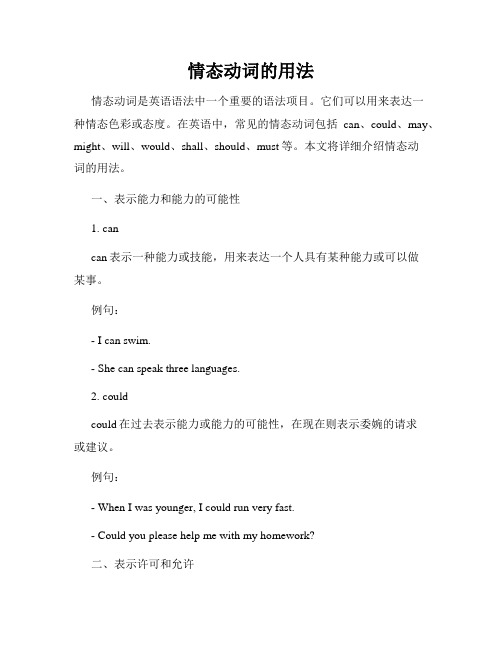
情态动词的用法情态动词是英语语法中一个重要的语法项目。
它们可以用来表达一种情态色彩或态度。
在英语中,常见的情态动词包括can、could、may、might、will、would、shall、should、must等。
本文将详细介绍情态动词的用法。
一、表示能力和能力的可能性1. cancan表示一种能力或技能,用来表达一个人具有某种能力或可以做某事。
例句:- I can swim.- She can speak three languages.2. couldcould在过去表示能力或能力的可能性,在现在则表示委婉的请求或建议。
例句:- When I was younger, I could run very fast.- Could you please help me with my homework?二、表示许可和允许may表示请求和征求允许的委婉方式。
例句:- May I borrow your pen, please?- May I ask you a question?2. cancan表示许可和允许,与may往往可以互换使用。
例句:- Can I have another piece of cake?- Can I go to the party tonight?三、表示可能性和推测1. maymay表示对某事发生的可能性的推测。
例句:- It may rain tomorrow.- He may be late for the meeting.2. mightmight表示对某事发生的低可能性的推测。
- I might travel abroad next year.- He might not come to the party.四、表示义务和必要性1. mustmust表示义务和必要性,强调说话人的主观判断。
例句:- You must finish your homework before going out.- We must be at the airport by 8 o'clock.2. have tohave to表示外部的义务和必要性,比must更加客观。
高中英语情态动词详细讲解及例句
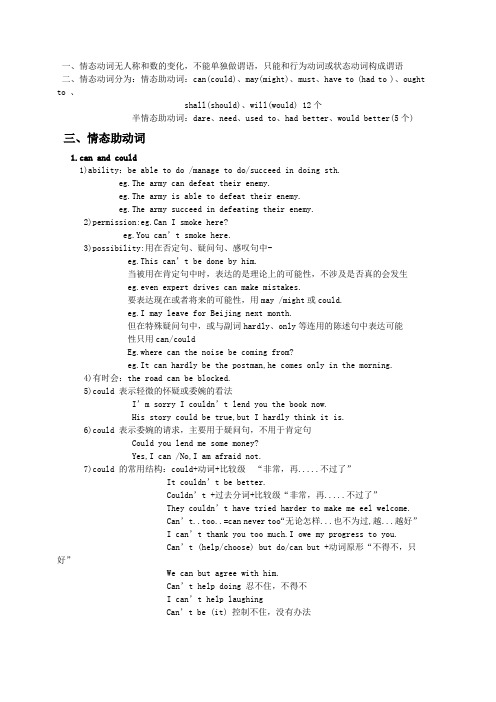
一、情态动词无人称和数的变化,不能单独做谓语,只能和行为动词或状态动词构成谓语二、情态动词分为:情态助动词:can(could)、may(might)、must、have to (had to )、oughtto 、shall(should)、will(would) 12个半情态助动词:dare、need、used to、had better、would better(5个)三、情态助动词1.can and could1)ability:be able to do /manage to do/succeed in doing sth.eg.The army can defeat their enemy.eg.The army is able to defeat their enemy.eg.The army succeed in defeating their enemy.2)permission:eg.Can I smoke here?eg.You can’t smoke here.3)possibility:用在否定句、疑问句、感叹句中-eg.This can’t be done by him.当被用在肯定句中时,表达的是理论上的可能性,不涉及是否真的会发生eg.even expert drives can make mistakes.要表达现在或者将来的可能性,用may /might或could.eg.I may leave for Beijing next month.但在特殊疑问句中,或与副词hardly、only等连用的陈述句中表达可能性只用can/couldEg.where can the noise be coming from?eg.It can hardly be the postman,he comes only in the morning.4)有时会:the road can be blocked.5)could 表示轻微的怀疑或委婉的看法I’m sorry I couldn’t lend you the book now.His story could be true,but I hardly think it is.6)could 表示委婉的请求,主要用于疑问句,不用于肯定句Could you lend me some money?Yes,I can /No,I am afraid not.7)could 的常用结构:could+动词+比较级“非常,再.....不过了”It couldn’t be better.Couldn’t +过去分词+比较级“非常,再.....不过了”They couldn’t have tried harder to make me eel welcome.Can’t..too..=can never too“无论怎样...也不为过,越...越好”I can’t thank you too much.I owe my progress to you.Can’t (help/choose) but do/can but +动词原形“不得不,只好”We can but agree with him.Can’t help doing 忍不住,不得不I can’t help laughingCan’t be (it) 控制不住,没有办法It can’t be helpedCan’t....without 没有...就不能One can’t succeed without perseverance.2.may and might1)permission:May I use your pen?Yes,you may./No,you may not.2)Possibility:用于推测,表示不确定,不用于疑问句中She may know Tom’s address.出现I’m afraid.I’m not sure等表示不确定时,常用may/might.I’m afraid he might not come to attend the meeting today.从语气上判断,may表示的可能性比might 大,might更多的表示怀疑He may be very busy now.He might be very busy now.3)用于让步状语从句中However hard you may study,you cannot master English in a month.4)用于祈使句,表示祝愿May you succeed!5)might 常用于表示轻微的责备和委婉的请求You might post the letter for me if you are going near a post box.You might have let me know before!6)习惯用法:may as well do”理所当然,有足够的理由”She may be proud of her sonMay /might (just) as well do=had better do(最好)You might as well stay at home tonight.May/might as well+do A+as+do+B”与其做B不如做A”You might as well throw the money away as lend it to him.One may as well not know a thing at all as know it but imperfectly 3.must and have to1)表示义务,一定要,必须You must arrive in good time.The meeting is very important.2)表示肯定性或难以避免,必然会,肯定会All men must die.3)must 表示有把握的推测,一定是,准时Must do/must be doing/must have doneThe tall fellow must be a basketball player.Let’s have something.You must be starving.He must have received mu letter which has mailed last week.4)must 表示非要,偏要,常以第二人称为主语,意指不耐或令人不愉快的事情,用于其他人称,表示主语固执,意为偏偏Why must you buy that car?Jane was never a pleasant young girl.After you gave her your advice,she must goand do the opposite.5)must 的三种否定形式表示不可能 must be --can’t be must have done--can’t have done You must have met him before.You can’t have met him before.表示不必 must do--need not to/don’t have toWe must get up at six tomorrow morning.We don’t have to get up at six tomorrow morning.表示决不能,严禁 must--mustn’tYou mustn’t park your car here.6)回答以must提问的句子Must we clean all the rooms?Yes ,you must/No ,you don’t have to/No ,you needn’t7)must 可做名词,表示必须有的东西,必须做的事Warm clothes are a must in the mountains.8)must和have to 表示必须时,有一下差别Must 表示的是说话人主观的看法,而have to则往往强调客观需要The play is not interesting ,I really must go now.I have to work when I was your age.Must 一般只表现在,have to 则有更多的时态。
情态动词用法

情态动词用法情态动词是英语中的一类特殊动词,用来表示说话人对某种行为或状态的态度、推测、能力、可能性、建议等。
情态动词常常和动词原形搭配使用,具有一些特殊的语法和用法规则。
本文将详细介绍情态动词的基本用法和几种常见的情态动词。
一、情态动词的基本用法1. 表示能力:情态动词可以用来表示能力或技能。
常见的能力情态动词有can和could。
例如:- I can swim.(我会游泳。
)- She could play the piano when she was young.(她小时候会弹钢琴。
)2. 表示可能性:情态动词可以表示某种行为或状态的可能性。
常见的可能性情态动词有may、might和could。
例如:- It may rain tomorrow.(明天可能会下雨。
)- I might go to the party tonight.(我可能会去参加今晚的聚会。
)- He could be late for the meeting.(他可能会迟到会议。
)3. 表示推测:情态动词还可以用来表示说话人对某种事实的推测。
常见的推测情态动词有must、may、might和could。
例如:- He must be tired.(他一定很累。
)- They may be on vacation.(他们可能在度假。
)- She might have forgotten her keys.(她可能忘记带钥匙了。
)- It could snow tonight.(今晚可能会下雪。
)4. 表示允许和禁止:情态动词还可以表示某种行为的允许或禁止。
常见的允许情态动词有can、may和could,常见的禁止情态动词有mustn't和shouldn't。
例如:- You can go now.(你现在可以走了。
)- May I borrow your pen?(我可以借用你的钢笔吗?)- You mustn't smoke here.(你不能在这里抽烟。
含有情态动词的句子
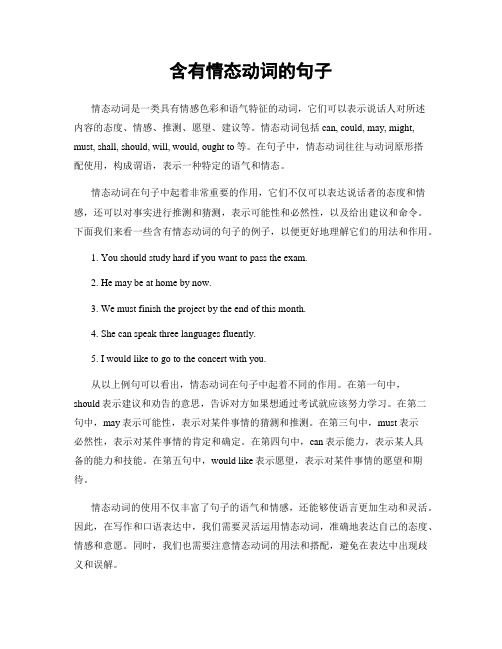
含有情态动词的句子情态动词是一类具有情感色彩和语气特征的动词,它们可以表示说话人对所述内容的态度、情感、推测、愿望、建议等。
情态动词包括 can, could, may, might, must, shall, should, will, would, ought to等。
在句子中,情态动词往往与动词原形搭配使用,构成谓语,表示一种特定的语气和情态。
情态动词在句子中起着非常重要的作用,它们不仅可以表达说话者的态度和情感,还可以对事实进行推测和猜测,表示可能性和必然性,以及给出建议和命令。
下面我们来看一些含有情态动词的句子的例子,以便更好地理解它们的用法和作用。
1. You should study hard if you want to pass the exam.2. He may be at home by now.3. We must finish the project by the end of this month.4. She can speak three languages fluently.5. I would like to go to the concert with you.从以上例句可以看出,情态动词在句子中起着不同的作用。
在第一句中,should表示建议和劝告的意思,告诉对方如果想通过考试就应该努力学习。
在第二句中,may表示可能性,表示对某件事情的猜测和推测。
在第三句中,must表示必然性,表示对某件事情的肯定和确定。
在第四句中,can表示能力,表示某人具备的能力和技能。
在第五句中,would like表示愿望,表示对某件事情的愿望和期待。
情态动词的使用不仅丰富了句子的语气和情感,还能够使语言更加生动和灵活。
因此,在写作和口语表达中,我们需要灵活运用情态动词,准确地表达自己的态度、情感和意愿。
同时,我们也需要注意情态动词的用法和搭配,避免在表达中出现歧义和误解。
在英语学习过程中,掌握情态动词的用法是非常重要的。
英语情态动词例句
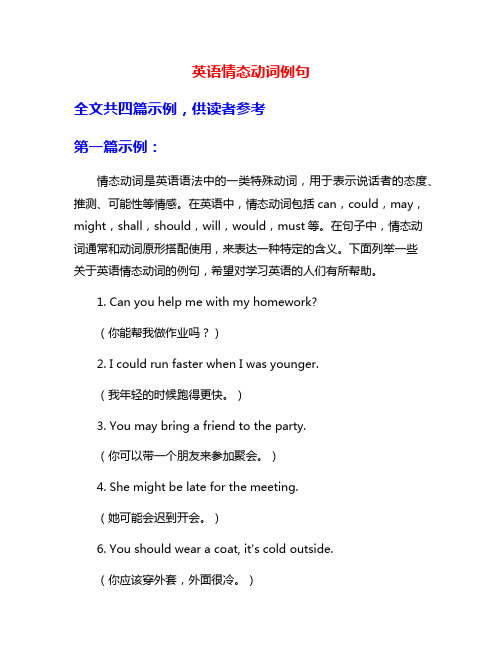
英语情态动词例句全文共四篇示例,供读者参考第一篇示例:情态动词是英语语法中的一类特殊动词,用于表示说话者的态度、推测、可能性等情感。
在英语中,情态动词包括can,could,may,might,shall,should,will,would,must等。
在句子中,情态动词通常和动词原形搭配使用,来表达一种特定的含义。
下面列举一些关于英语情态动词的例句,希望对学习英语的人们有所帮助。
1. Can you help me with my homework?(你能帮我做作业吗?)2. I could run faster when I was younger.(我年轻的时候跑得更快。
)3. You may bring a friend to the party.(你可以带一个朋友来参加聚会。
)4. She might be late for the meeting.(她可能会迟到开会。
)6. You should wear a coat, it's cold outside.(你应该穿外套,外面很冷。
)10. He can speak three languages fluently.(他能流利地讲三种语言。
)14. Shall we dance together?(我们一起跳舞吧?)17. If it snows, we would have a snowball fight.(如果下雪了,我们就会打雪仗。
)20. She could have been a doctor if she had gone to medical school.(如果她去医学院了,她本来可以当医生的。
)以上是关于英语情态动词的例句,希望能帮助大家更好地了解和运用这一语法知识,提高英语表达能力。
希朝世界观友在学习英语的过程中能够多加练习,加深对情态动词的理解,提升自己的语言能力。
第二篇示例:英语情态动词是一类特殊的动词,用来表达说话者对某种行为或状态的态度。
情态动词的用法总结表格

情态动词的用法总结表格|情态动词|用法|例句||||||can|表示能力,“能,会”|I can swim 我会游泳。
|||表示许可,“可以”|You can go now 你现在可以走了。
|||表示可能性,“可能”|It can be very cold in winter 冬天可能会很冷。
||could|can 的过去式,表示过去的能力|I could ride a bike when I was five 我五岁时就能骑自行车。
|||could 可用于委婉地提出请求、建议等|Could you please help me? 您能帮我一下吗?||may|表示许可或请求许可,“可以”|May I come in? 我可以进来吗?|||表示可能性,“也许,可能”|It may rain tomorrow 明天可能下雨。
||might|may 的过去式|He said that he might come 他说他可能来。
|||用于可能性较小的推测|She might be at home 她也许在家。
||must|表示必须,强调主观上的“必须”|You must finish your homework 你必须完成作业。
|||表示肯定的推测,“一定”|He must be very tired 他一定很累了。
||have to|表示客观上的“不得不”|I have to go now 我现在得走了。
|||有人称、数和时态的变化|She has to do a lot of housework 她不得不做很多家务。
||should|表示应该,常用来提出建议|You should study hard 你应该努力学习。
|||表示推测,“应该”|They should be there by now 他们现在应该到那儿了。
||ought to|同 should ,表示应该|You ought to listen to your parents 你应该听你父母的话。
情态动词be动词形容词用法
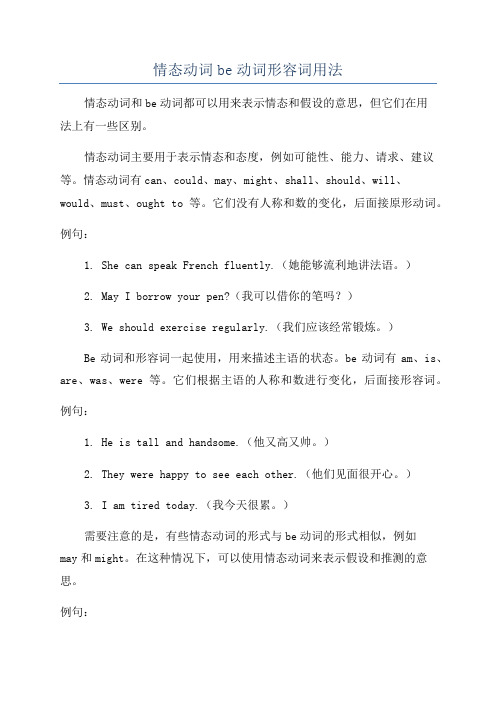
情态动词be动词形容词用法情态动词和be动词都可以用来表示情态和假设的意思,但它们在用法上有一些区别。
情态动词主要用于表示情态和态度,例如可能性、能力、请求、建议等。
情态动词有can、could、may、might、shall、should、will、would、must、ought to等。
它们没有人称和数的变化,后面接原形动词。
例句:1. She can speak French fluently.(她能够流利地讲法语。
)2. May I borrow your pen?(我可以借你的笔吗?)3. We should exercise regularly.(我们应该经常锻炼。
)Be动词和形容词一起使用,用来描述主语的状态。
be动词有am、is、are、was、were等。
它们根据主语的人称和数进行变化,后面接形容词。
例句:1. He is tall and handsome.(他又高又帅。
)2. They were happy to see each other.(他们见面很开心。
)3. I am tired today.(我今天很累。
)需要注意的是,有些情态动词的形式与be动词的形式相似,例如may和might。
在这种情况下,可以使用情态动词来表示假设和推测的意思。
例句:1. He may be late for the meeting.(他可能会迟到会议。
)2. She might be tired after a long day at work.(她可能会在工作了一整天后感到疲倦。
情态动词的用法
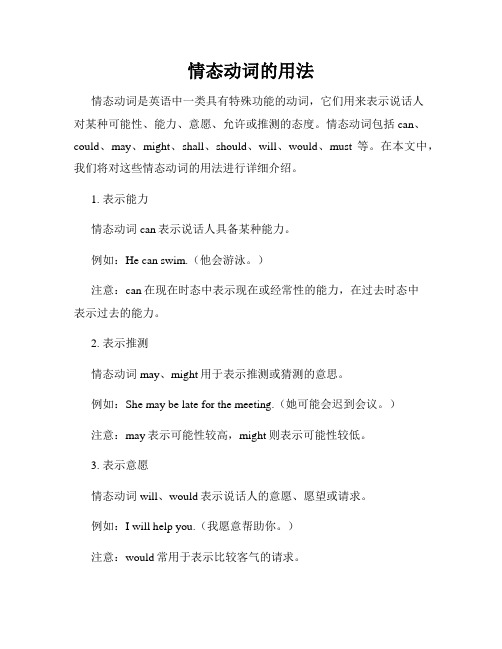
情态动词的用法情态动词是英语中一类具有特殊功能的动词,它们用来表示说话人对某种可能性、能力、意愿、允许或推测的态度。
情态动词包括can、could、may、might、shall、should、will、would、must等。
在本文中,我们将对这些情态动词的用法进行详细介绍。
1. 表示能力情态动词can表示说话人具备某种能力。
例如:He can swim.(他会游泳。
)注意:can在现在时态中表示现在或经常性的能力,在过去时态中表示过去的能力。
2. 表示推测情态动词may、might用于表示推测或猜测的意思。
例如:She may be late for the meeting.(她可能会迟到会议。
)注意:may表示可能性较高,might则表示可能性较低。
3. 表示意愿情态动词will、would表示说话人的意愿、愿望或请求。
例如:I will help you.(我愿意帮助你。
)注意:would常用于表示比较客气的请求。
4. 表示推测的过去情态动词must常用于表示对过去情况的推测或肯定。
例如:He must have missed the bus.(他肯定错过了公交车。
)注意:must用于表示对过去情况的肯定,而might用于表示对过去情况的推测。
5. 表示义务或必要性情态动词must表示对义务、必要性或确定性的肯定。
例如:You must finish your homework.(你必须完成作业。
)6. 表示建议或应该情态动词should表示建议或应该。
例如:You should go to bed early.(你应该早点睡觉。
)注意:should还可以表示对过去情况的推测,例如:He should have arrived by now.(他现在应该已经到达了。
)7. 表示允许或许可情态动词can与may可以用于表示许可或允许。
例如:Can I borrow your pen?(我可以借你的钢笔吗?)8. 表示可能性情态动词could用于表示可能性。
- 1、下载文档前请自行甄别文档内容的完整性,平台不提供额外的编辑、内容补充、找答案等附加服务。
- 2、"仅部分预览"的文档,不可在线预览部分如存在完整性等问题,可反馈申请退款(可完整预览的文档不适用该条件!)。
- 3、如文档侵犯您的权益,请联系客服反馈,我们会尽快为您处理(人工客服工作时间:9:00-18:30)。
一.Can、could• 1.表能力、能够(现在,过去时)•Some of us can use the computer now, but we couldn’t last year.• 2. can 表请求和许可•1)表请求时,口语中常用could 代替 can 使语气更委婉,回答时用can•--- Can/Could I use your dictionary•---Yes, you can. No, you can’t.•2)表示“许可”,可与may 换用•You can go home now.• 3.表推测。
表惊讶、怀疑、不相信。
用于否定,疑问句和感叹句。
• I am sure you can't play it well. •How can you say that•惊异,不相信• 4.客观可能性常用于肯定的陈述句中,表示理论上的或习惯上的可能性,”有时可能会”,不涉及具体事件。
•Everybody can make mistakes.• 5. could + have + done 本可以做但没做表示对过去能做而未做的事情感到惋惜,遗憾 Could not have done 不可能做•It’s a pity. Your class could have got the first prize.•If he studied hard recently,he couldn't have failed the exam.二.May、might1)表示允许或征询对方许可,允许,有“可以”之意,一般疑问句否定回答用can’t/mustn’t。
在请求对方许可时,如果Might I…?就比用May I…?语气更婉转些,May I have a dance with you--Yes,you may/can.--No, you can’t/mustn’t.(2)表示推测,可能性,多用于肯,否句,“或许”、“可能”之意,如果用might表示可能性更小, may/might have done 表示对过去的事情进行可能的猜测They may be in the library now.Mary may have gone to the concert last night.3).may表祝愿May you succeed三.Must•(1)must表示义务或强烈的劝告说话人主观上“必须”、“应该”之意,其否定式?must not,缩写形式为?mustn‘t,表示“不应该”,“不准”、“不许可”或“禁止”之意•We must study hard and make progress every day.•You mustn‘t touch the fire.•(2)以must提出的疑问句否定回答用needn't 或用don't (doesn't) have to (不?必)来回答,而不用mustn't, mustn't表示的是“禁止”或“不许可”之意,•---Must we finish the work tomorrow ---No, you needn’t/ don’t have to, but youmust finish it in three days.•(3)must:表推测用于肯定句(十分肯定)“一定…,肯定…”Betty must be in the next room.•4). 表某人非得或偏偏做某事•Must you make so much noise四.Will•(1)will用于第二人称疑问句,表请求或征求意见,would 语气委婉•1)Will you lend me your book• 2) Would you like a cup of tea •(2)用于各人称,可以表示“意志”或“决心”,(would用于过去情况)• I will be right here waiting for you.•I would go with him if he saved my brother.•(3)will可以表示一种习惯性的动作或某种倾向,有“总是”或“会要”之意, would可以表示过去的习惯动作,比used to正式,并没有“现已无此习惯”的含义•Every morning he will have a walk along this river.•Every evening, she would sit by window, deep in thought.•4)多用于否定句中,表示“不肯、就是不•This door won’t open.•(5)表示公用能力“能”•The room will seat 100 persons.•(6)表猜测,will主要用于第二、三人称,will be(对目前情况的推测),will have done(将来完成)。
would表料想或猜想,would have done本想做而没做•Maybe by then you will have changed your mind.•五。
Shall• 1. shall用于一、三人称疑问句。
征求意见或请求。
•Shall we dance• 2. Shall 用于二、三人称:表说话人给对方的许诺、命令”、“警告”、“强制”、“威胁”... •He shall go first, whether he wants to or not.•If you do well in your study, you shall get a gift.•He shall be punished for what he has done.•3. Shall 与第三人称连用,在条约、规定、法令等文件中表示义务或规定,意为“应该、必须”•It has been announced that all people shall remain in their seats until all thepapers have been collected.•六。
should•1)should 的意思是“应该”,表示给出建议或忠告询问建议。
•You should learn from each other. •2)表推测,往往有一定根据“按道理应当”有把握•We should arrive before dark. 我们按说能在天黑前到达.• The roads should be less crowded today.今天路上不致於那麽拥挤了.• 3.表示惊讶。
意为“竟然”•That he should speak to you like that is quite astonishing. 他竟然这样对你说话, 实在让人吃惊.4)Should (not)have done表示过去没有做到本来应该做的事情,或是做了本来不应该做的事情。
•You should have give him more help.• 5. shouldVs ought to(should:主观原因;ought to:客观原因)•As students, we should study hard.•He ought to be punished because he broke the law.•七。
Need 需要 dare•做情态动词时用于否定和疑问句。
•We needn't talk.•We don't need to talk.dare有其过去时dared.•doesn’t dare (to) do•I daren't go home.•I doesn’t dare go home.•八 . had better+动词原形•It is raining hard outside. You’d better not go out.•一、表示对过去事情的推测或估计• 1. mus t have done “想必或肯定已经做了某事”• eg: The ground is rather wet, so it must have rained last night.• 2. may/might have done “可能/大概已经做了某事”• eg: Tom may have gone to shanghai, but I still not sure about it.• 3. can’t/couldn’t have done “不可能已经做了某事”• The ground is very dry, so it can’t have rained last night•注:在疑问句中 can/could 表示对过去情况的疑问性•推测,“可能已经…了吗”• Someone must have broken into our bedroom,• Who could have done it •1)语气部分:(以下情态动词语气由强至弱)•肯定句:must、may、might(=could)•否定句:can’t(=couldn’t)、ma yn’t、mightn’t??疑问句:can、could(语气更加委婉不确定)(2)时态部分:be/do 表示对现在的推测have done 表示对过去的推测be doing 表示对正在进行的推测•二、表示对过去所发生事情的遗憾或责备• 1. should/ought to have done “过去本该做而没做• I really regretted wasting the hours when I should have studied hard, but it wastoo late.• 2. shouldn’t/oughtn’t to have done •“过去不该做的事却做了”•I’m very sorry for the words I shouldn’t have said to you at that moment.• 3. could/might have done “本来能够做的事却没做• He could have worked out the problem.• 4. needn’t have done “原本不必做的事却做了”• Your home is not far from your school, so you needn’t have left in such a hurry. • 5. Would rather have done “本想做却未做成”• I would rather have come to help you with your English, but I was too busy at that time.•。
